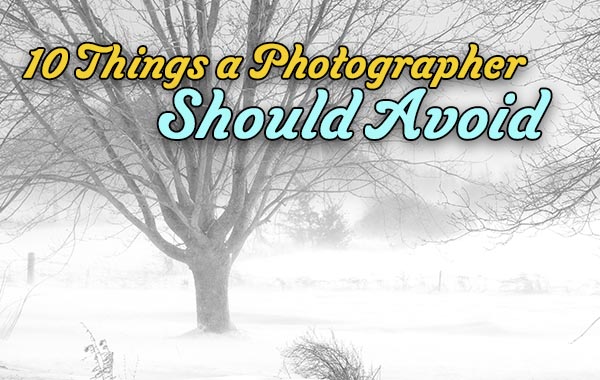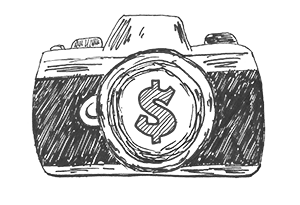10 Things photographers should avoid doing
Shooting with a dirty lens
I think that not cleaning your lenses after every shoot should be illegal. It takes no more than 30 seconds to clean the front and rear glass. Do it after a shoot and your lenses will always be ready to go. Dirty lenses can screw up the results of a great photoshoot.
Shooting with a dirty sensor
You need to learn how to clean your camera’s sensor. It’s not hard to do, and the cleaning kits are cheap to buy. You will know your sensor is dirty when your images have round spots in them. Yes, you can remove the spots easily when you are editing your images, but when you have taken over a thousand pics at a wedding, you’ll wish the sensor was clean.
Now I can hear you saying, “my camera has a self-cleaning function”, that won’t remove all the dirt though. So if you’re getting dirt spots, clean your sensor.
Not communicating with your customer
This is a big one. You need to ask questions to know what they want. It doesn’t matter if you are working for free, ask them if there is anything in particular they want.
You might be shooting a family session, but the parents want a few photos of just them. So make sure you ask questions and find out what they really want from the shoot.
If you want the family to wear certain colors, make sure to tell them.
Communicate.
Dressing too casual for a paid shoot
I was a guest at a wedding many years ago and the official photographer was wearing jeans and a tee-shirt. His work was great but he didn’t go over too well with the parents that paid for him. Another one at a close friend’s wedding was wearing a tuxedo. I have no idea how he managed to work all day wearing that.
All I’m saying is to match your clothing to the event. Jeans and a tee-shirt might be great for some family sessions but not a wedding.
Over-promising
Now, I have been guilty of this on a few occasions. I over-promised how fast the images will be ready after a wedding. It’s better to deliver earlier than promised, so give yourself a 30% buffer. Instead of 2 weeks, tell them 3 weeks, and deliver in 2½ weeks.

Not carrying everything to need
This is something I have learned the hard way. Think about what you’re going to be shooting and what could happen. Don’t find yourself wishing you had a longer lens or had a flash with you. Many a time I’ll go out with just a 50mm lens and see something that needs a different focal length, and it drives me mad.
If you’re shooting a portrait session using flash, make sure you have double the amount of batteries needed. I’ve done a few shoots where they extended the session and I was fine because I carry a huge amount of batteries. The same goes for memory cards, stock up and take them with you.
Not securing your kit when traveling
When you are packing your equipment make sure it is secure and can’t move around. If your lenses are loosely packed into your bag or case, you risk damaging them. Make sure they fit snuggly and add foam or even a towel if needed. You don’t want to break a lens walking to a shoot.
Not carrying a first aid kit
Another one I have suffered from. I was setting up my light stands and I cut my finger. I had to spend the next hour shooting with a lens cloth wrapped around the injured finger. It actually helped as it was my middle finger, and the couple I was shooting kept giggling as I took their photo and insulted them at the same time.
If I had a small first aid kit with me everything would have been more professional but not as much fun.
Don’t use a new piece of equipment for the first time on a shoot.
If you buy a new piece of equipment make sure you know how to use it before doing a shoot with it. I’m thinking of flashes, tripods, flash triggers, even a new camera body. It’s hard to look cool with a new camera that you don’t know how to use.
Only shooting in Manual mode
Everyone tells you, including me, that you need to shoot in manual mode. Well, there are going to be times when the stress levels are high and the last thing you need to be doing is fishing around in manual mode. Take away the stress by shooting in aperture priority mode whenever you.
Recap – 10 things you should avoid
- Shoot with a dirty lens
- Shoot with a dirty sensor
- No communicating with your customer
- Dressing too casual for a paid shoot
- Over-promising
- Not carrying everything you need
- Not securing your equipment
- No first aid kit
- Don’t use a new piece of equipment for the first time on a shoot
- Only shoot in manual mode
